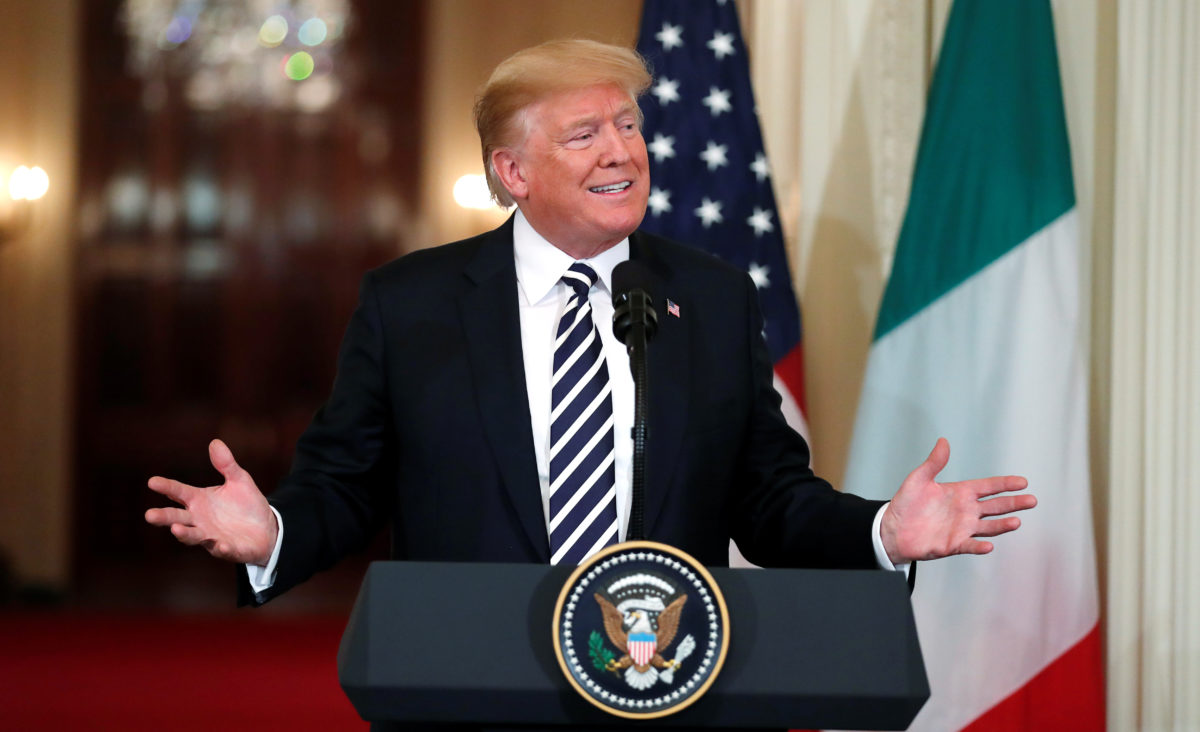U.S. President Donald Trump has agreed to meet Iranian leaders “anytime they want to” and without preconditions, an announcement of his that comes in the context of recent tensions between Washington and Tehran.
"I believe in the meeting, I would certainly meet with Iran if they wanted to meet," Trump said at a White House joint press conference with visiting Italian Prime Minister Giuseppe Conte on Monday.
"I don't know that they're ready yet. I ended the Iran deal. I do believe that they'll probably end up wanting to meet," the US president said and added that a meeting with Rouhani would be "good for the country, good for them, good for us, and good for the world.”
Meanwhile, Secretary of State Mike Pompeo said following Trump’s remarks that “if the Iranians demonstrate a commitment to make fundamental changes in how they treat their own people, reduce their malign behavior, can agree that it's worthwhile to enter into a nuclear agreement that actually prevents proliferation, then the president said he's prepared to sit down and have the conversation with them."
"In his first major foreign policy speech as secretary of State two months ago, Pompeo set 12 demands for conducting new talks with Iran which was found by Tehran as a serious obstacle blocking the way for reaching a new deal. Tonight President Trump with his remarks obviously removed the obstacle and paved the way for a new round of direct talks between Tehran and the White House, showing green light to Iranian counterparts," Farhad Daneshvar, economic expert and co-founder of AzerInvest Consulting Group told Caspian News.
In a response to Trump’s statement, Hamid Aboutalebi, an advisor to the Iranian president, posted to Twitter, “Respecting the Iranian nation's rights, reducing hostilities and returning to the nuclear deal are steps that can be taken to pave the bumpy road of talks between Iran and America.”
Tensions between Iran and the U.S. have been on the rise since May, after Trump announced the U.S.’ withdrawal from the 2015 Iran nuclear deal, called the Joint Comprehensive Plan of Action (JCPOA). Once again, Iran will once face tough economic sanctions, which are expected to be piled on by the U.S. and go into full effect in November. The Trump administration is aiming to tie a new nuclear agreement to limits on Iran's ballistic missile program and its role in regional conflicts in the Middle East, including its support to proxy groups such as Hezbollah.
In a tweet posted on July 22, Trump addressed Iranian President Hassan Rouhani in an all-capital letters posting: “NEVER, EVER THREATEN THE UNITED STATES AGAIN OR YOU WILL SUFFER CONSEQUENCES.” Earlier Rouhani had threatened to shut down the Strait of Hormuz, the world's busiest sea lane for oil exports, if the United States goes through with the oil-related sanctions, which would severely weaken Iran’s already-beleaguered economy.
Yemen's Iranian-backed Houthi rebels forced Saudi Arabia to suspend oil shipments through a nearby strait in the Red Sea last week after they attacked a pair of Saudi tankers. The recent visit of Omani Foreign Minister Yusuf bin Alawi to the U.S. and his meeting with Defense Secretary James Mattis have fueled speculations about the sultanate’s mediation in resolving the existing disputes between the hostile countries, according to the Baku-based Institute for Strategic Analysis.
Oman is a Persian Gulf Arab state that maintains friendly ties with both the U.S. and Iran, and has acted as important, behind-the-scenes go-between for the two countries that had severed diplomatic relations in 1980.
On July 18, the Iranian president’s Chief of Staff, Mahmoud Vaezi, claimed that during a visit to New York for a United Nations General Assembly meeting in September 2017, Iranian President Hassan Rouhani received eight requests from his U.S. counterpart Donald Trump for a meeting, according to Iran’s Tasnim news agency.







 Russian peacekeeping forces, deployed in the Karabakh (Garabagh) region of Azerbaijan since 2020, have commenced their withdrawal from the area.
Russian peacekeeping forces, deployed in the Karabakh (Garabagh) region of Azerbaijan since 2020, have commenced their withdrawal from the area.
 The number of evacuees from flooded areas in Kazakhstan has reached 97,852 people, including about 32,856 children since March 27.
The number of evacuees from flooded areas in Kazakhstan has reached 97,852 people, including about 32,856 children since March 27.
 The Islamic holy month of fasting, Ramadan comes to an end this week with the celebration of a joyous festival called Eid (meaning “festival” in Ar...
The Islamic holy month of fasting, Ramadan comes to an end this week with the celebration of a joyous festival called Eid (meaning “festival” in Ar...
 Azerbaijan officially unveiled the logo for the upcoming 29th session of the Conference of the Parties to the United Nations Framework Convention o...
Azerbaijan officially unveiled the logo for the upcoming 29th session of the Conference of the Parties to the United Nations Framework Convention o...



